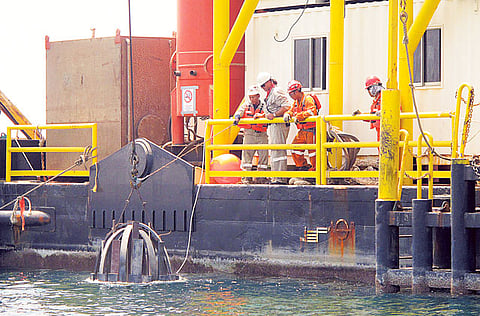New pseudo reef sunk at Jebel Ali
New artifical reef will be home to six species of corals

Dubai: Threatened marine life in UAE waters will benefit from a new artificial reef installed yesterday near a seawall off the port of Jebel Ali, said project overseers Atlantis, The Palm.
Large circular sections constructed from recycled plastic were lifted with great care from a crane barge into Gulf waters and will provide the foundation for relocated coral propagation to grow and multiply.
The deployment of the artificial reef is the work of the marine team at Atlantis, The Palm which has since last year been creating new underwater reef areas to help marine life cope with lost habitat due to development, pollution and overfishing.
With the co-operation of Environment Health and Safety – Trakhees as well as McDermott Middle East, the new artificial reef at Jebel Ali installed on Thursday is the third such pseudo reef to be put in place by Atlantis along the Dubai shoreline.
“This will help provide new habitat for fish and marine species in UAE waters,” Dennis Blom, manager of The Lost Chambers at Atlantis, told Gulf News on site yesterday.
“Already in the area, we’re seeing hamour and small butterfly fish returning. These artificial reefs are bringing back life.”
Guy McLear, HSES director with McDermott Middle East noted that “as one of the first companies to set up in the Jebel Ali Free Zone, we saw this as a great opportunity to give something back to the environment. A core element of our business is marine and subsea construction, so we are very pleased to be able to support the coral enrichment program.”
Follow-up inspections have shown that pseudo reefs sunk last year are supporting health algae, barnacles, and tube worms amid a sweeping array of fish and invertebrates now calling the seafloor structures home.
The key to drawing new life to the reefs is the live coral that is propagated at Atlantis, The Palm aquariums and then translocated to the artificial reefs put down since 2011.
Atlantis said that since “February 2012, a total of 320 coral fragments have been propagated from the initial mother stock of 68. Once they make significant growth, they are transferred to the pseudo reefs that are being deployed.”
The success of the relocated corals is good news for scientists contemplating the effects of global warming.
Echoing reports that suggest Gulf water corals may hold the key to future coral survival on a warmer planet, Blom noted that corals here can survive higher salinity levels and higher temperatures.
“Currently the world’s reefs are at risk from many threats including high salinity, soaring temperatures, bleaching and marine pollution from commercial sea vessels, however, the growth of the translocated corals has been quite significant, making our field efforts to protect and enrich the natural environment a real success.”
The latest work by Atlantis is being complemented by similar coral relocation efforts by the Emirates Marine Environmental Group.
In June, Gulf News reported that thanks to the translocation in late 2008 of more than 11,000 living coral specimens to the northwest Crescent B breakwater of Palm Jebel Ali, marine life is thriving, said Keith Wilson, marine programme director of the group.
Underwater inspection showed more than 30 types of fish now call the relocated coral system home and the diversity of marine life continues to expand, Wilson said at the time.
“There was a net loss of coral in the Jebel Ali area but it’s not all doom and gloom,” Wilson told Gulf News. “The coral is coming back. We looked at it after a year and 95 per cent of the translocated coral survived.”
Sign up for the Daily Briefing
Get the latest news and updates straight to your inbox



